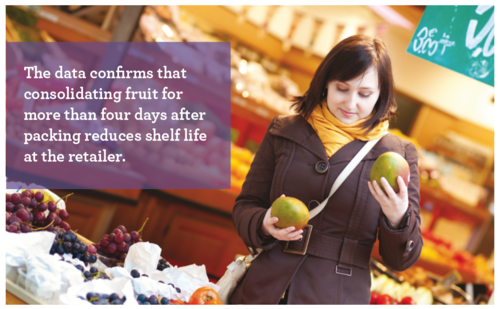ARTICLE: Making good decisions from your cold chain temperature data
Maintaining an effective cold chain by monitoring temperature is the most important thing you can do to ensure the best quality product when it arrives in market. In the past, temperature loggers had to be retrieved to access the data, but a new generation of loggers can give you real-time information about the temperature and location of your consignment without relying on someone to retrieve the logger and send data to you.
Once you have the data, what you do with it will determine whether you get the best returns for your fruit. The more data you have, the more confident you can be about your decisions.

By monitoring the data from existing and new supply chains (new chain partners or markets) you will be able to identify where best practice isn’t being followed and any critical control points in your supply chain that warrant close attention to ensure a good result.
Regularly collecting data can help you make small changes to your supply chain that will have a positive impact, particularly on the quality at arrival at the importer and the shelf life that you can offer the retailer.
Refining best practice cold chain guidelines
The Serviced Supply Chains project has generated data on how ‘R2E2’ mango fruit behave at different temperatures and for various time periods that are typical of those experienced during air and sea freight exports. The data confirms that consolidating fruit for more than four days after packing reduces shelf life at the retailer. The data also shows that fruit transported by sea freight for 20 or more days under a controlled atmospheres, has a significantly reduced shelf life, making more distant markets unattractive. These results have already driven practice change in Manbulloo’s mango export chains. These findings will refine the industry best practice cold chain guidelines.
Developing predictive models
To help make good decisions based on the mountains of data from trials, simulations and monitoring of actual shipments of R2E2 fruit, the project team are developing models to predict outturn quality and remaining shelf life along an export chain. These predictive models firstly describe the export chain in its entirety and then, by linking each step in the chain, can estimate the rate of fruit quality loss during export.
John Lopresti, Senior Plant Physiologist with Department of Economic Development, Jobs, Transport and Resources in Victoria said, ‘by the end of the project we are aiming to develop an easy-to-use, web-based app to predict remaining shelf life. For any consignment, growers and exporters should then be able to import their temperature data into the app and be able to simulate fruit-quality changes for that consignment’
‘This should give some guidance on whether a particular consignment has been exposed to excessively high temperatures during distribution and needs to be actively managed because it has reduced shelf life,’ John said.
Fruit from different farms, seasons and maturities can behave very differently, so the initial version of the web-based app will likely provide relatively conservative estimates of shelf life and recommendations for practice change. However, it will indicate the potential for this approach and the value of further development to refine the accuracy. The project team also aims to include financial decision making into the app so that, with enough data, you will be able to determine the effects of cold chain improvements on outturn quality and estimate if these improvements are worth implementing.
No matter what amount of data you can access, a strong, trust-based relationship with your supply chain members (agent, importer and retailer) is required to maximise the benefits of this approach—regular and detailed exchange of information on the history of the fruit, temperatures and durations during distribution, and outturn quality, are important.
For more information contact: Noel Ainsworth, Principal Supply Chain Horticulturist, at DAF; noel.ainsworth@daf.qld.gov.au or (07) 3708 8563.
Acknowledgements: The Serviced Supply Chains project is funded by the Hort Frontiers Asian Markets Fund, part of the Hort Frontiers strategic partnership initiative developed by Hort Innovation, with co-investment from the Department of Agriculture and Fisheries, Queensland (DAF), Department of Economic Development, Jobs, Transport & Resources (Victoria), Manbulloo (mangoes), Montague Fresh (summerfruit), Glen Grove (citrus), the Australian Government plus in-kind support from the University of Queensland and the Chinese Academy of Sciences.
Article submitted by Noel Ainsworth and Yiru Chen from DAF.